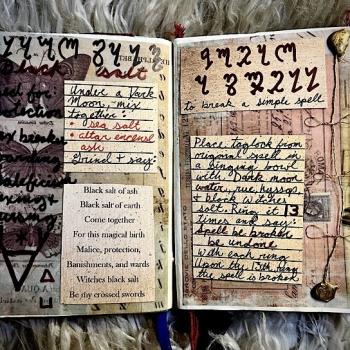The title of Priest or Priestess is a somewhat contentious one within the Pagan and related communities. When someone calls themselves a Priest/ess, we can’t be entirely sure what they mean exactly. When we add our Christianised worldview into the mix, we often end up making assumptions about the person and what they mean by the title. For the most part, however, the title isn’t used in the same way it is used in Christianity and so our assumptions are often, though not always, way off base.

Reasons People Take the Title
Because
Well, it is one reason! They use the title because they want to. Some people are of the opinion that if they are devoted to a specific deity above the others, then this means they should take on the title of Priest/ess. This is especially true for people who are basically the only member of their specific religion. I mean, if you basically create your own tradition, you technically would be the Priest/ess within that religion.
The problem people have with this, is that it doesn’t always work that way. Being devoted to a deity and being the authority of your own religion and technically the priest/ess of your religion, doesn’t actually make one a priest/ess of a deity. And it certainly doesn’t give the person any authority over other people who worship that deity outside of that persons very specific individual tradition.
Deity Said So
Many of those who take on the priestly title do so because a deity has said they are. Sometimes it is told to them or to someone else, usually via divination or similar.
Sadly, this is one that many have trouble believing as well. I say sadly because it’s sad that so many have so little trust in the ability of the Gods to communicate with us. But it is a fact that it’s not exactly something that we can prove easily. One an perform their own divination asking a deity if the person is truly a priest/ess, but if it isn’t our business, we aren’t actually too likely to get a proper answer.
Ordained
Now some people may be ordained by their group or organisation to be the Priest/ess of not only the group but the deity if the group. So lets say the (made up) Temple of Hephaistos names some of its members as Priest/ess of the Temple and of Hephaistos. What does this mean?
It means these people are indeed of the Priesthood of the Temple and of Hephaistos within the Temple. But outside of the Temple this title may be completely meaningless to other people, because they are not bound by the Temple itself. Some outsiders will accept the designation, some will not.
What a Priest/ess Does
Private Devotion
As outlined above, one of the reasons people take on the title just because, so it follows that the majority of things such people do is personal, relating to their own personal devotions and perhaps things involving their family. But other than those devotions, they don’t really do anything and generally don’t expect anything from anyone.
Service to Others to the Gods
This is the most commonly accepted form of priesthood. In this, a Priest/ess is someone who is in service to the deity and to the people. They are someone who serves the deity by serving the people for the deity. So they will lead and perform rituals for other people, they will make offerings and sacrifices for people, they might teach people about their deity and they may even bring people to worship of that deity (hopefully in a non-door-knocking way).
It should be pointed out though that service in this manner is about doing things for the deity and for the people at the same time. So, feeding the poor in your deities name is a nice act, but it isn’t necessarily a priestly one. It does nothing, really, for the deity. It doesn’t bring people closer to the deity, it doesn’t help people know the deity, it doesn’t show people the power of the deity. So that sort of thing is far more a devotional act than it is a priestly one.
Temporary Service
This is similar to above, as it requires service, but it is actually even closer to traditional priestly roles – in Hellenism anyway.
You don’t just see this in modern Hellenism or Polytheistic traditions though – you see it in many different Pagan traditions, especially the witchy ones. This is where someone is called upon to take on the role of priest/ess for a specific period of time, or for a specific service and then they let go of the title immediately after.
This may be for a specific number of years, months, weeks or days. It might be for a single ritual, leading the group ritual for this one time and someone will do it next time – putting them in the priestly role. And for some groups the person is only a priest/ess when the group gathers for religious purposes, but if they just meet up for a casual friendly dinner, there is not priest/ess present. Just people.
It’s Just a Job
Historically, in ancient Greece at least, the role of a priest/ess might not mean anything more than the above outlined services provided. The priest/ess didn’t have to be devoted to the deity in any special way, they just had to perform their duties. Indeed, in some cases people would become a priest/ess for a year or so just so they could get paid!
Thus it is that sometimes, even in modern times, the priestly role isn’t as special as some may think it is. It isn’t a position of high authority – in fact sometimes the priest/ess is far more a servant than a master. They aren’t necessarily any more knowledgeable than anyone else, they aren’t always more devoted than anyone else. They are just doing a job as has been asked of them or as they felt the need to do.
Conclusion
Each religion has its own history, its own rules, its own version of priesthood. The rules that apply to one will not necessarily apply to another. We can get ideas from history and I suggest looking up the history of your own religion or the specific deity.
Most of our Pagan religions are different from the monotheistic religions. When thinking about the word “Priest or Priestess” try not to apply a Christian bias to it. Meaning, don’t assume that a Pagan or Polytheist Priest is anything like a Christian Priest. They aren’t necessarily saying they speak for the Gods to you, they aren’t necessarily saying they have authority over you with the Gods. Their priestly title may have nothing to do with you at all.
Of course, we can’t deny there are people out there who take the title for the wrong reasons and try to use it as a weapon, a way to place themselves above everyone else. But these are less frequent than some Pagans assume. So don’t be too quick to assume their title is wrong.
















